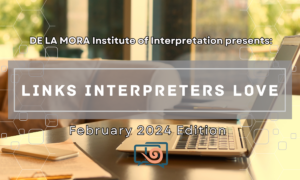
LIL: Translating or Interpreting Idioms and Metaphors
Accurately translating idioms, metaphors, or indeed any form of figurative language can be very tricky – they bring along a lot to think about in one language, let alone two. Idioms and metaphors are loaded with stylism and hidden messages which can be a nightmare to transfer into a second language. Lots of times there isn’t even a logical equivalent in that second language, so what are we as interpreters to do? Well, we can narrow it down to three techniques or methods which help us to convey the message as best we can. It all comes down to one…
LIL: Resources for Improving Specialized Vocabulary
One of the most important qualities of a good interpreter is being studious – that is, a good interpreter is always looking for ways to learn new things and improve their skills.
When first entering the field, new interpreters and translators are often overwhelmed by the vast amount of specialized vocabulary and jargon that are present in their fields. Many fields – like the medical and legal fields, for example – have such a high level of speech that interpreting within them can be a great challenge. Luckily, there are resources everywhere that can help us interpreters improve and expand…
LIL: Difficulties with Simultaneous Interpretation

http://spanishabq.com/wp-content/uploads/2016/02/1-simultaneous-interpretation-equipment-bosch-interpreting-colombia.jpg
Simultaneous Interpretation is one of the most difficult forms of interpretation that brings with it all kinds of difficulties and drawbacks. As a language student studying to be an interpreter, Simultaneous Interpretation is still my biggest weakness – I find it extremely difficult if not nearly impossible at the moment. I imagine that there are a lot of interpreters out there that share this opinion, so this week we’ll be looking at some of the things that make Simultaneous Interpretation the…
LIL: Ethics and You
As interpreters, we are all bound to certain ethical guidelines and principles. These guidelines allow us to navigate precarious situations without overstepping our professional boundaries. Each field (and usually each individual organization or association) has its own code of ethics for its professionals, and there are also ethical standards for testing as well.
This week we’ll be looking at some examples of ethical codes from each of these three norms: Medical Interpretation, Court Interpretation and Testing.
FOR MEDICAL INTERPRETERS

https://www.okomeds.com/wp-content/uploads/2016/05/medical-interpreter.jpg
Compared to court interpretation, medical interpreters have to take on more “roles” while interpreting. “Roles” referring…
LIL: Staying Motivated While Self-Studying
Undoubtedly, the most difficult thing about self-study is to maintain discipline and stay motivated while you progress through the course. The fact that there’s nothing stopping you from just dropping it at anytime is daunting for many, as well as the fact that there’s no one but yourself to remind you to complete assignments and stay on track. With these things in mind, we’ve compiled some tips to help you with your self-studies, which hopefully will help you “stay the course” (pun intended)!
Set Realistic Goals
Setting work goals, more importantly setting realistic and achievable goals that fit…














